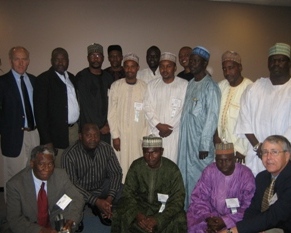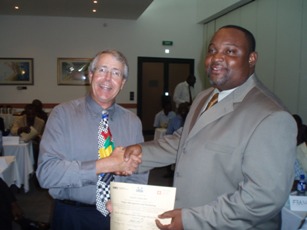Home » International
Category Archives: International
Nigerian Delegation Visits NAHB
 Nations Building News ran a story on two delegations from Nigeria that I had the opportunity to work with on improving their home building businesses.
Nations Building News ran a story on two delegations from Nigeria that I had the opportunity to work with on improving their home building businesses.
NAHB International Ghana Report
 On September 4, 2009, I had the opportunity to travel to Accra, Ghana on behalf of the NAHB International to deliver two University of Housing CGB (Certified Graduate Builder) designation courses to the members of GREDA (Ghana Real Estate Developers Association). Sponsored by the World Bank and facilitated by the International Finance Corporation, the training was intended to enhance and improve the project management and scheduling skills of the builders in Ghana. My contact in Ghana was Bill Donovan who works for the Frankfort School of Finance and Management. In addition, I had the opportunity to meet Dr. Sally Merrill, a mortgage finance specialist who works for The Urban Institute and was evaluating the complete program for SECO (State Secretariat for Economic Affairs), a Swiss based donor organization.
On September 4, 2009, I had the opportunity to travel to Accra, Ghana on behalf of the NAHB International to deliver two University of Housing CGB (Certified Graduate Builder) designation courses to the members of GREDA (Ghana Real Estate Developers Association). Sponsored by the World Bank and facilitated by the International Finance Corporation, the training was intended to enhance and improve the project management and scheduling skills of the builders in Ghana. My contact in Ghana was Bill Donovan who works for the Frankfort School of Finance and Management. In addition, I had the opportunity to meet Dr. Sally Merrill, a mortgage finance specialist who works for The Urban Institute and was evaluating the complete program for SECO (State Secretariat for Economic Affairs), a Swiss based donor organization.
To be honest, the complicated nature and organization of the funding and planning of this training is still something of a mystery to me, but somehow, someway, it all came together. All of the arrangements and negotiations with the various organizations for my trip were handled by Barbara McMurray, Susanna Connaughton, and Guiliana Nave of the International Department of NAHB. They spent endless hours working on logistics and planning, and were instrumental in making the trip a success.
Upon arrival on Saturday the 5th, I had the opportunity to tour three housing projects in and around Accra. One was a small, high end, mixed use project right in Accra. The second was an “affordable” project located on the outskirts of the city, and the final project visited was a master planned community, with several different price points, located about 20 kilometers from the edge of Accra. The importance of these site visits cannot be overstated. Without them, the value and relevance of the course material to the audience would be severely diminished, if effective at all.
 On Monday the 7th , the first course, Project Management, was held at the Fiesta Royale Hotel. This is the same hotel where I was staying. The room set-up, registration, and AV was identical, perhaps better, than that for many courses I have instructed in the States. Although many of the students were late arriving (a cultural issue), the class went very well with lots of interaction and discussion. The builders had a very good command of English, though for me, understanding some of them was difficult at times. Several were educated in the UK or US. Mr. Mike Puplampu is the Executive Director of GREDA. He attended both days of class and was extremely helpful when any cultural or language differences reared their head.
On Monday the 7th , the first course, Project Management, was held at the Fiesta Royale Hotel. This is the same hotel where I was staying. The room set-up, registration, and AV was identical, perhaps better, than that for many courses I have instructed in the States. Although many of the students were late arriving (a cultural issue), the class went very well with lots of interaction and discussion. The builders had a very good command of English, though for me, understanding some of them was difficult at times. Several were educated in the UK or US. Mr. Mike Puplampu is the Executive Director of GREDA. He attended both days of class and was extremely helpful when any cultural or language differences reared their head.
The Scheduling course was presented on Tuesday the 8th. From a student interaction standpoint, we had very lively discussions regarding their scheduling issues. My ability to better relate to their issues was greatly enhanced by the site visits on Saturday. The two days of class, in my opinion, were well received and helpful to the builders who attended. From the standpoint of administering the classes, the students followed instructions better than in most U.S. classes.
During the two days, I also presented a program that I wrote on “How America Builds”. This program was well received and helped the builders understand how we develop land and build homes. It presented many opportunities for discussion on the similarities and differences between building in Ghana and the U.S.
The builders of GREDA are smart, professional, and hungry for education. They recognize that the U.S. has well developed processes and systems that can help them improve their businesses. Along with training for the builders, there is a great need for workforce training. In my opinion, NAHB in general, and specifically the UofH, HBI, NCHI, and perhaps the Research Center have a tremendous opportunity to expand their influence and create additional sources of revenue. Just as importantly, we have an opportunity to help emerging nations improve their housing options by continuing these International outreach programs.
